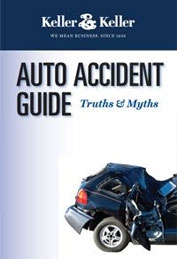Car accidents are always frightening, but when you are pregnant, the fear is magnified. It is important for all drivers to know that an expectant mother's immediate actions following an automobile accident are critical to ensuring the best possible treatment, follow-up care, and overall outcome for the mother-to-be and her unborn child. Our Indianapolis car accident attorney details more here.
Pregnant Women Have Unique Risks
The risks of increased complications following an automobile accident can be great and are reason for heightened observation by your doctor and/or OBGYN. A trained professional will be able to provide an expectant mother with specialized treatment that is specifically designed for her condition.  For instance, certain types of traditional physical therapy may not be suitable for pregnant women.
For instance, certain types of traditional physical therapy may not be suitable for pregnant women.
Car crashes, no matter the size, present a number of unique risks to pregnant women. The more serious types of aftereffects can include: pre-term labor, miscarriage, internal bleeding, hemorrhaging, birth defects, and/or creating a high-risk pregnancy that did not exist before the crash. (It's important to note that a high-risk pregnancy can create complications before, during, and/or after the birth. These complications can affect both the mother and her unborn child.)
More subtle risks for a pregnant woman may include stress and emotional duress. This type of mental anguish can result from the trauma of the accident or the long-term mental stress caused by birth complications, or, in extreme cases, the loss of the child. This type of emotional duress warrants legal representation for the expectant mother and her unborn child.
What to Do Immediately After the Crash
Call 911 or other emergency services right away if you think you need emergency care after an auto accident, or if you experience any of the following:
- Loss of consciousness
- Vaginal bleeding
- Pain in your belly or pelvis
- Fluid leaking from your vagina, or believe that the umbilical cord is bulging into your vagina. (If this occurs, immediately get down on your knees so that your bottom is higher than your head. This will decrease the pressure that is on the umbilical cord until medical help can arrive to assist you.)
See Your Doctor After the Car Accident
While we suggest every pregnant woman visit their doctor following ANY accident, you should always call your doctor immediately if you experience any of these conditions in the hours, days, weeks, or months after a car accident:
- Vaginal bleeding or spotting
- Swelling in your face or fingers
- Leakage of fluid or increased vaginal discharge
- Severe or unrelenting and constant headaches
- Pain in your abdomen or shoulder areas
- Persistent vomiting that is not connected to morning sickness
- Chills or a fever
- A noticeable change in the frequency or strength of your baby's movements
- Painful or urgent urination
- Faintness or dizziness
Speak a Personal Injury Lawyer Today
What Is a High-Risk Pregnancy?
Simply put, your pregnancy is considered high-risk if you or your baby has suffered an injury and has thus increased the chances of health complications. Car accidents contribute significantly to a woman’s chances of having a high-risk pregnancy. If you have been in an accident, even a minor fender bender, it is imperative that your doctor closely monitor you during your pregnancy to find or detect any problems that may arise.
Risks to the Baby
It's possible that a fetus can suffer severe injury in an instance where no physical contact was made. A quick stopping motion can expose a mother and her fetus to a type of injury known as a contra-coup injury. This occurs when a concussion or shock is produced by a blow or other injury, in a part or region of the body opposite to that at which the blow is received, which often causes rupture or disorganization of the parts affected.
The aftereffects of an auto accident may place you and your unborn baby at higher risk for problems, such as slowed growth of the baby, preterm labor complications, elevated stress levels and blood pressure, pre-eclampsia, and problems with the placenta. However, it's important to remember that being at high risk doesn't mean that you or your baby will automatically have problems.
It’s possible that your doctor or primary care physician may decide to induce labor if he or she believes that your health, or that of your baby, could be at risk.
Will You Need a Specialist for a High-Risk Pregnancy?
Women will sometimes visit a doctor who specializes in high-risk pregnancies. These doctors are called maternal-fetal specialists, or perinatologists. In addition to these doctors, you may also be required to see your regular doctor. Because high-risk pregnancies require additional medical care, their costs greatly outweigh those of a normal pregnancy. We are often able to help soon-to-be mothers recoup these costs.
A car crash can lead to serious consequences for the pregnancy and the baby, including the following.
Miscarriage
Miscarriage, or spontaneous abortion, is the accidental and involuntary loss of a fetus before the 20th completed week of pregnancy. An expectant mother can also have what is called a partial miscarriage. This occurs when only part of the fetal tissue is expelled from the uterus after a miscarriage. The birth of a fetus that does not have a heartbeat after 20 weeks of pregnancy is labeled as a stillbirth.
Symptoms of a miscarriage include:
- Vaginal bleeding that can be either heavy, light, constant, or irregular. Although the bleeding is usually the first or principal sign of a miscarriage, bleeding can occur during the 1st trimester and may also occur with a completely normal pregnancy. However, bleeding that is accompanied by pain and discomfort can be a sign that miscarriage is more likely, especially after a trauma or injury.
- General pain such as pelvic cramping, abdominal discomforts and pain, or a persistent, dull aching in your lower back. It’s very important to note that pain after an auto accident may not be immediate, and may start a few hours to several days after bleeding has begun.
- Blood clots or grayish (fetal) tissue passing from the vagina is an additional sign of miscarriage.
It is not always easy to tell whether a miscarriage is taking place. Seeking professional medical treatment after the car accident is always the best course of action.
Premature Birth
A normal pregnancy lasts approximately nine months, or 40 weeks. A baby born prior to week 37 is premature. Many premature babies—those born closer to 37 weeks—do not have problems.
Babies who are born closer to 32 weeks may not be able to eat on their own, breathe on their own, or stay warm on their own. But after these babies further develop, most of them can leave the hospital safely. Babies born earlier than about six months are the most likely to have serious problems. If the baby was born very small or sick, there may be the possibility of having to face a difficult and grim life-or-death decision about the path of treatment for the new baby.
Having an understanding attorney can be critical in this instance, as they will be able to start legal proceedings on your behalf and speak with insurance adjusters at a time when you should be surrounding yourself with family and loved ones. This type of litigation can be delicate and emotionally charged, so be sure that you contact an attorney who has specific experience with handling accident claims in which an unborn baby is injured or lost.
Special Problems for Premature Babies
Medical professionals often call premature babies "preemies." Babies born prematurely may not be able to be fed by normal means through their mouth. They are most likely going to be tube-fed, or fed through an IV, depending on their condition and the situation. Tube-feeding can last until the baby is capable enough to breathe, suck, and swallow, and can feed by normal means through the breast or bottle. Also, until the newborn baby is capable of maintaining their own body heat, they are kept warm in a special bed called an incubator.
Babies who are born prior to completing growth inside the womb simply need more time to fully develop and finish their growing than a baby who goes full-term. It is only after the premature baby (preemie) outgrows his or her problems and complications caused by an early birth that he or she is sent home.
Another issue that can arise when a baby is born prematurely is that their major organs have not finished completely growing. This complication can also cause serious health problems. Any premature baby can have medical problems, but babies born before 32 weeks are even more susceptible to have more serious, costly medical problems. This furthers the notion that auto accidents can cause a stressful, daunting, frightening, and expensive pregnancy.
Treatment and Care for Preemies
Premature babies can require much more care and medical support than a full-term baby and are usually moved to the neonatal intensive care unit (NICU). Once moved to the NICU, the premature babies are monitored for any type of complications that could arise. These changes or complications can range from an infection to changes in breathing and heart rate, or the need for medicine—a few may even require surgery. This extra care can become very costly, very quickly.
Sick and very premature infants need special treatment as mentioned previously, and depending on what medical problems they have, those who need help breathing would need to be aided by an oxygen tube or a machine, called a ventilator, which helps to simulate the normal breathing functions and moves air in and out.
Long-Term Problems for Preemies
It is not easy to predict how healthy a premature baby will be prior to the baby being born, especially if the premature birth is a result of trauma or an accident and comes suddenly. No matter what the situation is, a medical professional is the best resource to help prepare you for whatever condition may arise. Your doctor will devise a plan of action regarding treatment based on your individual condition and how many weeks pregnant you will be when you are likely to give birth.
Premature babies do not always develop serious disabilities, however, the earlier a baby is born—the higher the risk for disabilities. Babies most likely to experience a long-term disability are those who are born before 26 weeks, or who are very small, 1.7lb or less. Long-term disability problems may include cognitive impairment or cerebral palsy.
Placental Abruption
During a normal pregnancy, the placenta will be attached firmly to the inner walls of the uterus until the baby is ready to be born. Placental abruption is the premature separation or abruption of the placenta before the expected or desired time frame for the birth. This can occur from any number of things, such as trauma from an auto accident.
Since the round, flat placenta is considered the lifeline that supplies everything the fetus needs from his mother, an abruption can be incredibly dangerous and even life-threatening for the fetus, and sometimes for the mother, depending on the extent of the injuries.
Placental abruption can lead to several problems that have already been discussed such as: pre-term birth, low birth weight, and large blood loss for the expectant mother. Reports even indicate that in some infrequent situations, placental abruption can lead to the fetus dying.
Causes of Placental Abruption
The causes of placental abruption are not well understood, and some women develop it without any identifiable cause. But you can reduce your risk by treating or avoiding some of the known risk factors that have been linked to placental abruption.
One of the common risk factors that can cause an expectant mother to have a placental abruption is a physical injury or trauma to the uterus. Having been in a car crash, minor or large, is a highly probable source for this type of injury.
Symptoms of Placental Abruption
If you have developed placental abruption, you may notice one or more symptoms, including: vaginal bleeding, a tender, painful, or hard, rigid-feeling uterus, signs of preterm labor, including regular contractions, lower back or abdominal ache or pain.
The amount of vaginal bleeding is not necessarily a good measure of how severe an abruption is. Heavy bleeding can even sometimes be the least apparent, as a large amount of blood can stay trapped between the uterine wall and placenta. Heavy blood loss can cause multiple symptoms that include: shock, dizziness, faintness, weakness, disorientation, restlessness, and shallow, quick breathing.
Statistics on Car Crashes and Pregnant Women
The following are some startling statistics from the Centers for Disease Control and Prevention (CDC) related to pregnancy and car crashes:
- Motor vehicle injuries are a leading cause of death and injury for pregnant women.
- Motor vehicle crashes are also the leading cause of traumatic fetal deaths.
- Between one percent and three percent of live-born infants are exposed in utero to a motor vehicle crash.
- 170,000 car crashes in the U.S. each year involve pregnant women.
- On average, 2.9 percent of women report being hurt in a “car accident” during pregnancy.
Loss of a Baby
Losing a baby is an incredibly agonizing and heartbreaking experience. No matter how early or how far into a pregnancy, these feelings can be sometimes overwhelming and too much to deal with by yourself. When a sudden loss occurs as a result of a car or truck accident, expectant parents will need free legal counseling.
We have several years of handling these very types of cases, and providing grieving, expectant parents with professional legal counsel has always been a responsibility that receives our undivided attention.
Although you may initially feel alone in your experience, you'll begin to discover that miscarriages, stillbirths, and neonatal death resulting from car crashes happen far more frequently than most of us are led to believe. Quite frankly, you're not alone, and there will always be others who can relate to you and your loss.











